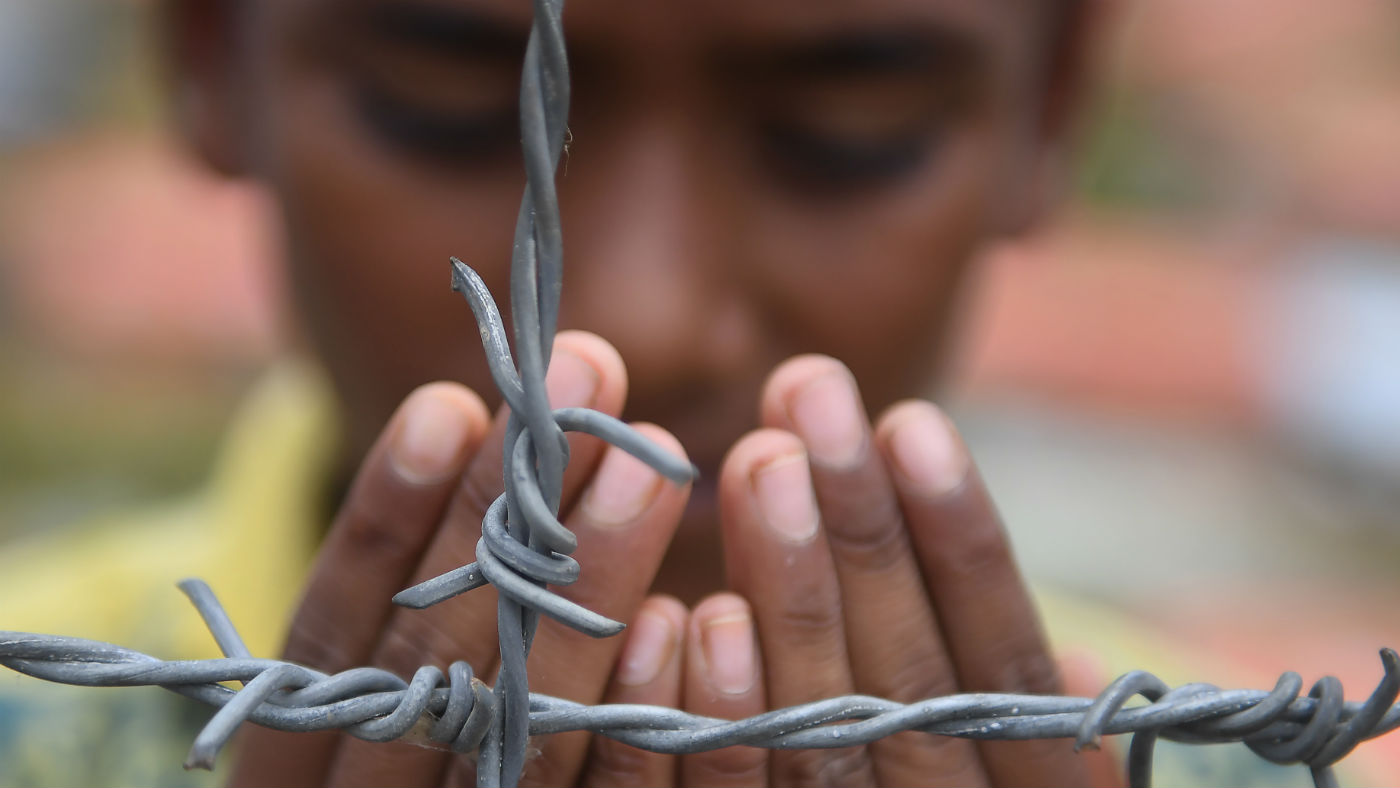Myanmar guilty of Rohingya ‘genocide’ says UN
Military leaders could face prosecution while Aung San Suu Kyi criticised for failing to prevent crimes against humanity

A free daily email with the biggest news stories of the day – and the best features from TheWeek.com
You are now subscribed
Your newsletter sign-up was successful
Myanmar’s military has been accused of genocide against the Rohingya in a damning UN report that alleges the army is guilty of crimes against humanity, and which recommends several of its top leaders face prosecution for war crimes.
UN fact-finders, who were denied access to Myanmar but interviewed 875 witnesses who had fled the country, said the all-powerful armed forces, known as the Tatmadaw, were “killing indiscriminately, gang-raping women, assaulting children and burning entire villages” in the northern state of Rakhine, home to the Muslim Rohingya, as well as in the Shan and Kachin regions.
The Tatmadaw also carried out murders, imprisonments, enforced disappearances, mass exterminations, deportation, torture, rapes and used sexual slavery and other forms of sexual violence, persecution and enslavement – all of which constitute crimes against humanity – which the UN called “the gravest crimes under international law”.
The Week
Escape your echo chamber. Get the facts behind the news, plus analysis from multiple perspectives.

Sign up for The Week's Free Newsletters
From our morning news briefing to a weekly Good News Newsletter, get the best of The Week delivered directly to your inbox.
From our morning news briefing to a weekly Good News Newsletter, get the best of The Week delivered directly to your inbox.
At least 700,000 minority Rohinhya have fled to neighbouring Bangladesh over the past year following a large scale military operation in Rakhine, instigated on the pretence of cracking down on deadly attacks by Muslim militants.
Conservative estimates put the death toll in the tens of thousands.
Amnesty International said security forces were guilty of a “targeted campaign of widespread and systematic murder, rape and burning”, and now the UN has agreed.
The report, “is the strongest condemnation from the UN so far of violence against the Rohingya”, says the BBC.
A free daily email with the biggest news stories of the day – and the best features from TheWeek.com
In an unusual move, the UN specifically singled out several high-profile figures within Myanmar’s army and government; calling for the commander-in-chief of the Tatmadaw, Min Aung Hlaing, to be investigated for genocide and crimes against humanity, and criticising the country’s de facto political leader, Nobel peace prize-winner Aung San Suu Kyi, for her “passive role” over the past year and her failure to use her “position as head of government, nor her moral authority, to stem or prevent the unfolding events in Rakhine state”.
The Guardian says the report “is very likely to anger Myanmar’s military and government”, which have denied genocide has occurred in Rakhine and claimed that the Rohingya instigated the violence by attacking security forces and then burning their own villages to the ground.
“Genocide is the most serious charge that can be made against a government, and is rarely proposed by UN investigators,” says BBC Southeast Asia correspondent, Jonathan Head.
The UN has led calls for Myanmar, formerly known as Burma, to be investigated by the international criminal court (ICC), but “that’s going to be very difficult”, says Al Jazeera’s Mohammed Jamjoom.
Myanmar is not a signatory to the Rome Statute that established the court, so a referral to the ICC would need the backing permanent five Security Council members “and China is unlikely to agree”, argues the BBC.
Even if the Security Council were to unanimously back Myanmar’s referral to the ICC, it is hard to see anyone being convicted.
As Sky News notes, “despite numerous ongoing investigations, the ICC has convicted only three living people, none of whom for genocide”.
Alternatively, the three-person UN panel that compiled the report has suggested setting up an international tribunal like those that investigated genocide and atrocities in Rwanda and the former Yugoslavia. It also urged the UN Security Council to impose an arms embargo on Myanmar and penalise those most responsible for crimes with travel bans and a freeze on assets.
A conspicuous failing of Myanmar’s civilian authorities identified by the panel was their failure to curb virulent hate speech by religious and national hard-liners on social media platforms, notably Facebook.
The report prompted an immediate response from the social media giant, who announced it had taken down 18 accounts and more than 50 pages associated with Myanmar’s military, including that of Min Aung Hlaing.
CNN says international experts have pointed to Facebook as being a major source of misinformation and hate speech fuelling violence against minorities in Myanmar.
A Reuters investigative report published earlier this month found that Facebook was “failing” to end hate speech against the Rohingya and other Muslims.
In a statement released following the UN report, Facebook admitted it had been “too slow” to prevent the spread of misinformation but defended its progress in a country where many people use it as a primary source of news and communication.
-
 Political cartoons for February 21
Political cartoons for February 21Cartoons Saturday’s political cartoons include consequences, secrets, and more
-
 Crisis in Cuba: a ‘golden opportunity’ for Washington?
Crisis in Cuba: a ‘golden opportunity’ for Washington?Talking Point The Trump administration is applying the pressure, and with Latin America swinging to the right, Havana is becoming more ‘politically isolated’
-
 5 thoroughly redacted cartoons about Pam Bondi protecting predators
5 thoroughly redacted cartoons about Pam Bondi protecting predatorsCartoons Artists take on the real victim, types of protection, and more
-
 The Week Unwrapped: Synthetic fuel, Myanmar and an energy rebate
The Week Unwrapped: Synthetic fuel, Myanmar and an energy rebatepodcast Could fuels made from CO2 and hydrogen end our dependence on oil? What’s happening in Myanmar? And will energy companies pay us to use less power?
-
 Home Office worker accused of spiking mistress’s drink with abortion drug
Home Office worker accused of spiking mistress’s drink with abortion drugSpeed Read Darren Burke had failed to convince his girlfriend to terminate pregnancy
-
 In hock to Moscow: exploring Germany’s woeful energy policy
In hock to Moscow: exploring Germany’s woeful energy policySpeed Read Don’t expect Berlin to wean itself off Russian gas any time soon
-
 Were Covid restrictions dropped too soon?
Were Covid restrictions dropped too soon?Speed Read ‘Living with Covid’ is already proving problematic – just look at the travel chaos this week
-
 Inclusive Britain: a new strategy for tackling racism in the UK
Inclusive Britain: a new strategy for tackling racism in the UKSpeed Read Government has revealed action plan setting out 74 steps that ministers will take
-
 Sandy Hook families vs. Remington: a small victory over the gunmakers
Sandy Hook families vs. Remington: a small victory over the gunmakersSpeed Read Last week the families settled a lawsuit for $73m against the manufacturer
-
 Farmers vs. walkers: the battle over ‘Britain’s green and pleasant land’
Farmers vs. walkers: the battle over ‘Britain’s green and pleasant land’Speed Read Updated Countryside Code tells farmers: ‘be nice, say hello, share the space’
-
 Motherhood: why are we putting it off?
Motherhood: why are we putting it off?Speed Read Stats show around 50% of women in England and Wales now don’t have children by 30